[The tl;dr stuff:] This is a long post. After the jump I detail how Chad Sansing and I have been collaborating on developing a card game called Learning Alchemy. Amongst the screenshots of Google Docs and card examples, I try to explore how collaboration is mediated in 2013. The short story: Chad and I have only met in-person 3 times and after both participating in a webinar in July we decided to begin an epic collaboration. Moving from wanting to create … something and play around the with rapidly-shifting landscape of gaming due to crowdsourcing, the narrative below is one of free-flowing thought being honed into something tangible. As I explain below, we are currently playtesting our game, soliciting card-remixes, and looking to “bring to market”* a product for people to enjoy.
* Note: I use this phrase very loosely.
Okay, as I’ve mentioned elsewhere, Chad and I were discussing project based learning on an NWP webinar over the summer. See?:
I knew Chad and I shared similar interests in game design and learning. One of our NWP friends, Paul Oh, had mentioned a raucous game of Epic Spell Wars of the Battle Wizards: Duel at Mt. Skullzfyre (Yes, the most epic game title ever). During our webinar we had talked in our presenters’ backchannel about an interest in Kickstarter and game design. Shortly after the webinar the following Twitter exchange occured:

CCG=collectible card game

Okay, it’s not really a *drinking game* … it involves saying inflammatory things to sway the favor of your table mates (it works when your partners are surly and open-minded).


Which led to a goole doc, “Kickstarter, Games, School, and Stuff.” The doc began pretty inauspiciously. Here’s the entirety of my getting-the-ball-rolling rant straight from google’s revision history:
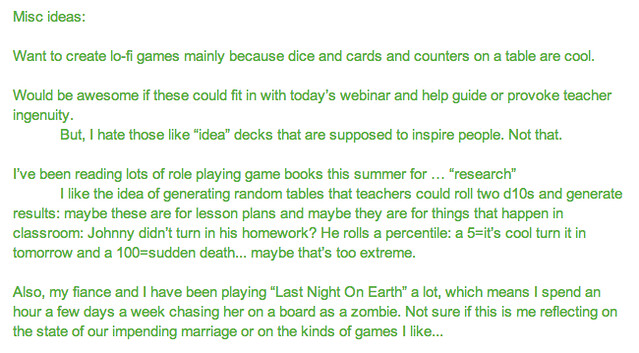
Clearly, I’m spitballing a lot of ideas here and seeing what might be of common interest with Chad. At this point, neither of us really concerned about a specific game or product – we are sharing gaming interests, preferred mechanics, and themes. These are all broad and the flexibility of commenting and adding to the document allowed us to find points of common interest to build on.
Needle Threading
After discussing games we both wanted to borrow mechanics from, Chad helped narrow down some of the focus of what we want to do as game designers:
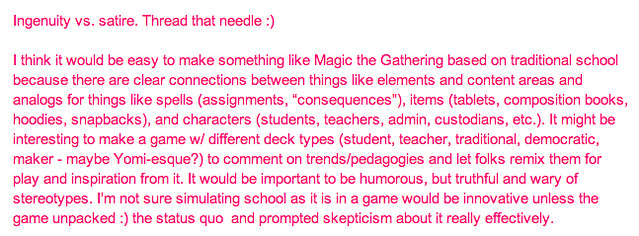
We unpacked this a bit more and eventually came up with a bulleted list of different game styles we could explore. In addition to the flexibility of deck-building games like Magic: The Gathering and Dominion, we also liked the world-building play of Carcassonne. I would add that Dominion and Carcassonne are two of the games Ally and I play most often, Takenoko is quickly catching up (can you compete with a game where part of the goal is to feed a panda in a bamboo field?).

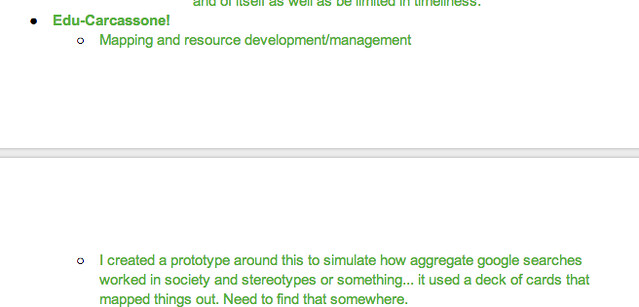
I should add that there was also a bullet point that said: “School, the RPG.” There was nothing there and I suspect that is a much bigger project for us to ruminate on. (See the first in a series of posts where Chad discusses RPGs in his school here.) Eventually we decided on a hybrid game-model that builds out a learning setting while also allowing players to move around the fluctuating board. Our second of three Google hangouts discussing this project ended with us agreeing to write out narratives of how we imagined typical gameplay would unfold. Basically, before we began to write rules and design cards, we wanted to understand what the game would look and feel like. Below is my first stab at a turn of play:
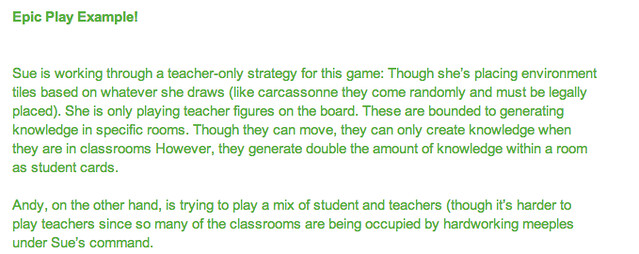
Designing Alchemy
At this point, things kind of exploded. All of the above unfolded over a roughly month and a half period (August through mid-September). We’d now decided on a basic game concept and a title: Learning Alchemy. We both like the different ways the title can be interpreted.
We continued to broadly sketch the game concepts until sketching was slowing down actual progress:
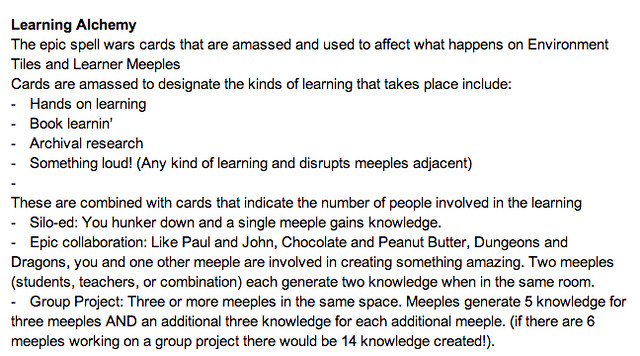
And then… life interfered (as it always does). I got really busy. My classes were demanding. I had a lot more meetings I was participating in. I had a book come out. In any case, while I was being kept busy at CSU, Chad’s production on Learning Alchemy went into overdrive. I signed into Google one day to find that, not only had Chad created a folder for our work, but he’d essentially organized and written a handful of the elements:
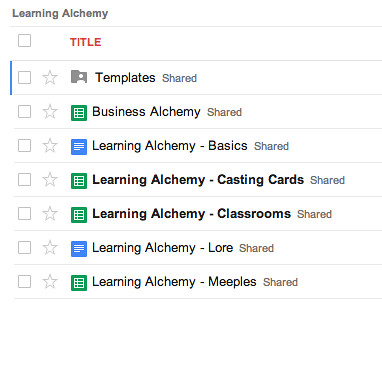
The “Lore” file, in particular, is thrilling. It spins the best narrative for the satirical & fantastical setting of the game. At the same time, the rules were drafted and the templates folder … well, the templates folder looked something like this:
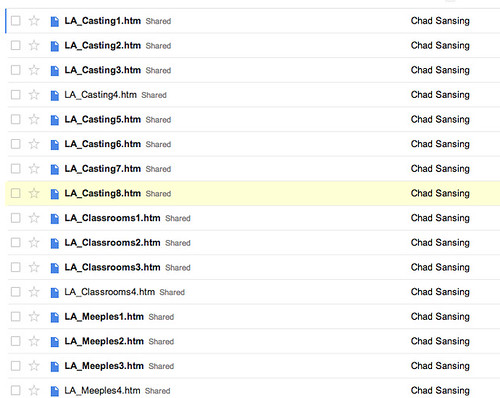
Each of these HTML files was a page of card mock-ups:
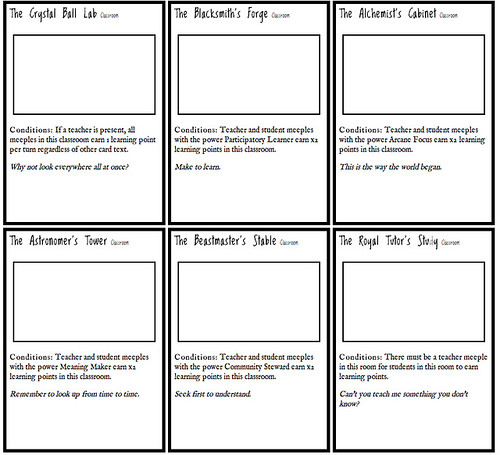
How awesome is that? (And how much more could I feel like a slacker… it’s not like Chad’s got tons of spare time: he’s teaching at a new school, he’s a dad, and he’s currently at Mozfest.)
Discussing his progress in another hangout at the beginning of October, we both agreed to print out and playtest the game:
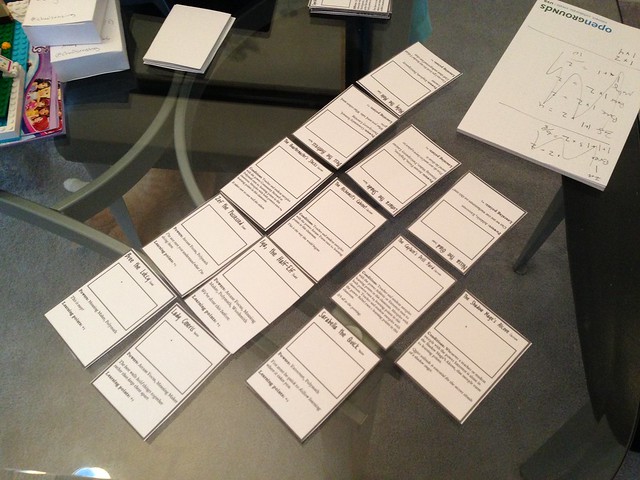
It’s not too shabby when, after slacking off, the next phase of work is playing more games.
And even though I helped write the game rules, I got exceptionally lost in my first few run throughs with Ally:

Looking Forward…
At this point, we’re refining the game and thinking about a bunch of the nitty-gritty stuff:

(We haven’t figured out what will happen for the art yet.)
Chad’s blogged about his goals of remixing the game cards and playtesting at Mozfest here. Chad’s Cardfox 1.0 not only looks like a useful way to get user-generated support for the game but also a tool for crowdsourcing game designs in the future. Oh, and as if I didn’t feel like a slacker already, Chad’s been designing some insanely awesome game concepts while at Mozfest like this and this.
…And Beyond
As I mentioned earlier, this is an in-progress project: I’m fascinated by how game designers like Monte Cook and Sandy Peterson and even the crazy Reaper Bones campaigns are using crowdfunding to reshape game publishing. Chad and I are intrigued by how we are able to collaborate in a digital age with very little in-person interaction. We tweet, email, and hangout. That’s how the work is getting done. Learning Alchemy is hopefully (likely?) the first in a series of game-development projects. It is “Participatory Action Research” for a digital age (from my researcher perspective) and it’s a whole lot of fun, so far (from my gaming-nerd perspective).